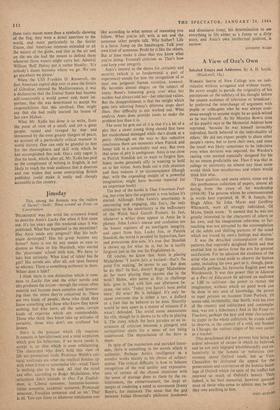Jimsday
This, among the Romans was the raillery of Slaves!—Swift; Hints toward an Essay on Conversation.
`PICARESQUE' was the word the reviewers found to describe Amis's Lucky Jim when it first came
out. It's ten years ago this weekend since it was published. What 'has happened in the meantime? Has Amis made any progress? Has his tech- nique developed? Has his grasp become any firmer? Amis is not by any means as easy to dismiss as Wain or Iris Murdoch, who started the 'picaresque' school with him. We have to take him seriously. What kind of talent has he got? His novels are, after all, not spun fantasy or whimsy. There is something authentic in them. Where does it hide?
I think there is one distinction which is com- mon to Lucky Jim and the other novels and
this produces the action—though the events often outstrip and become more complex and interest- ing than the terms they're conceived in. There are two kinds of people; those who think they know something and those who know they know nothing, but who have, all the same, certain kinds of expertise which are commendable. Those who think they know take up attitudes of certainty, those who don't are confused but honest.
Jim's is the position which life requires. It consists in bewilderment and a total scepticism which give his behaviour, if we move inside it, accept it, an elan which is even exhilarating. The characters who don't hold this view of life are pretentious fools. Professor Welsh's cul- tural 'weekends are what the intellect finishes up with when it tries to systematise life—wind. There is nothing else to be said. All that the mind can offer, according to Roger Micheldene, who articulates Jim's attitude in One Fat English- man, is 'Liberal nonsense, humanist-humani- tarian nonsense, academic nonsense, Protestant nonsense, Freudian nonsense and so on.' That is all. You can tome to whatever conclusion you
like according to what system of reasoning you follow. What you're left with is sex and the nonsense other people talk. Why bother? Life is a farce. Jump on the bandwagon. Talk your own kind of nonsense. Profit by it like the others. But at least make it clear that you know what you're doing. Forestall criticism so. That's how you keep your integrity.
Amis's interest in the desire for certainty and security (which is so fundamental a part of experience) entails for him the recognition of at least one poignant human situation, however. He becomes almost elegiac on the subject of Jenny Bunn's loosening grasp over what her mother had always told her—her inherited values. But the disappointment is that the insight which goes into selecting Jenny's dilemma stops short there. Her difficulty is not worked out. What analysis Amis does provide tends to make the problem less than it is.
The most he gets out of it is that it's a bit of a pity that a sweet young thing should first have her maidenhead damaged while she's drunk at a party. Although on the way to this reductive conclusion there are moments when Patrick and Jenny talk in a remarkably real way. But even that sense of pity is ambiguous. Amis is too close to Patrick Standish not to want to forgive him. Jenny seems genuinely silly in wanting to hold on to her virtue. Amis finds out a rich situation and then reduces it to inconsequence (though that, with the expending insight of a powerful imagination, might have become material for an important book).
The best of the books is That Uncertain Feel- ing, but even here the argument is won before it's started. Although John Lewis's uncertainty is convincing and engaging, like Jim's, the only alternative to his uncertainty is the buffoonery of the Welsh bard Gareth Probert. In fact, whenever a writer does appear in Amis he is phoney. John Lewis's unease and confusion are the honest registers of an intelligent integrity, and apart from him, Lucky Jim, or Patrick Standish, the world is peopled by hypocrites, liars and pretentious dim-wits. It's true that Standish is shown up for what he is, but he is tacitly forgiven just as the one fat Englishman is.
Of course, we know that Amis is placing Micheldene. 'I know he's a bastard—that's the point I'm making,' he seems to say. But does he do this? In fact, doesn't Roger Micheldene do far more placing than anyone else in the book? Helen, who seems at first to challenge him, goes to bed with him one afternoon be- cause, she says, 'Today you haven't been awful once.' He wins! He is indulged. It's only be- cause everyone else is either a tart, a dullard or a fool that he behaves as he does. Sincerity would be torn apart in a matter of minutes if it
wasn't defended. The social scene necessitates his role, though he is shown to be silly in playing it. The irony which the hero parades as an in- strument of criticism becomes a plangent and surreptitious claim for a sense of not being understood. The depreciation of the hero is sham.
In spite of the mannerism and paraded funni- ness, there is something in the novels which is authentic. Perhaps Amis's intelligence as a novelist works mainly in his choice of subject- matter. The critical difficulty is how to balance recognition of the real quality and expressive- ness of certain of the chosen situations with the sense of damage done to them by the ex-
hibitionism, the embarrassment, the inept at- tempts at rendering a mind in movement (Jenny Bunn's, for instance). The sense that the gap between Julian Ormerod's philistine bonhomie
and dismissive irony, his determination to see everything in life either as a funny or a dirty story, and Amis's own intellectual position, is narrow.


































 Previous page
Previous page